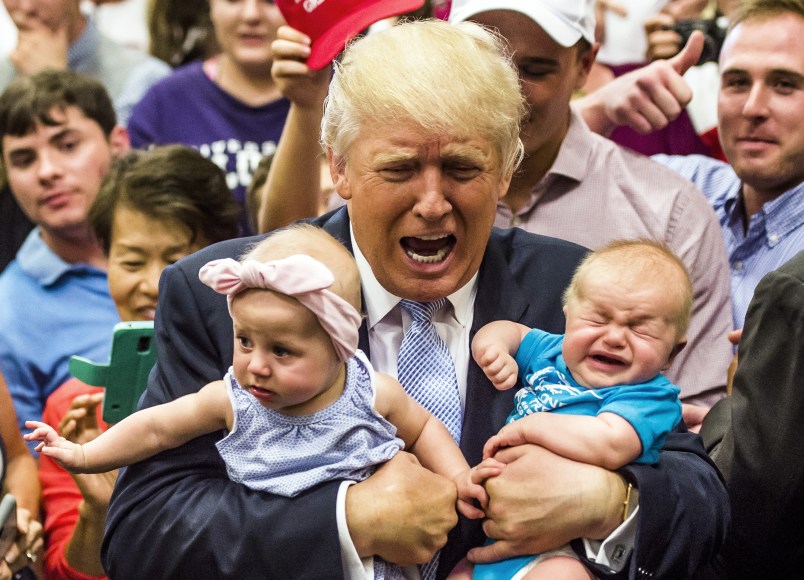Donald Trump gave his first hint last night that he might try to get out of the Fall presidential debates. I have thought for months that he’d likely try to get out of them. I think he will be at a steep strategic and tactical disadvantage in any debate with Hillary Clinton – a point I’ll expand on later. But from thinking he’d try to get out of the debates, I wasn’t clear how he’d do it without facing crushingly bad publicity and exposure as a coward. The latter is something that cuts apart everything his campaign is based on. A few weeks ago, I figured out what that strategy will be.
As usual, Hillary & the Dems are trying to rig the debates so 2 are up against major NFL games. Same as last time w/ Bernie. Unacceptable!
— Donald J. Trump (@realDonaldTrump) July 30, 2016
The requirement is simple: get out of the debates, make them not happen without seeming to be the one who’s running away or tanking them. Here’s how. I suspect Trump will start claiming that that the process is “rigged” because Gary Johnson and Jill Stein aren’t included. For better or worse (I think better), the debate commission rules are crystal clear: You need to hit 15% support in a certain number of major polls to be included. It’s highly unlikely Johnson will meet that threshold; it’s almost impossible that Stein will. Inclusion over exclusion has an inherent logic to it even if it’s obviously self-serving and not appropriate in this case. So I think Trump will find this a comfortable position from which to attack the debates themselves.
Trump does better in multi-person debates than one-on-ones. They’re much less debates in any real sense. They’re more like parallel taunt contests. The multi-person format also makes it easier to avoid policy detail. What’s more, Stein would certainly work with Trump in tag-teaming Hillary Clinton, putting her under fire from both the left and right. Johnson’s role is more uncertain. He less of an attack dog by temperament. And who he’d have more interest in attacking is less clear than it might seem. I’m sure Clinton would weather such a debate. But it’s clearly a less attractive option for her that a one on one with Trump.
What’s more, agreeing to such a debate in contravention of the debate commission rules and at Trump’s demand would show her giving into to Trump’s bullying, which would be extremely damaging quite apart from whether two person or four person debates are better in the abstract.
The other thing to remember is that for all their flaws, presidential debates are fairly substantive. They have high caliber moderators like Jim Lehrer. Candidates are pressed on real questions. It’s nothing like primary debates with a dozen or more participants. Trump’s major liability is that a substantial majority of the public either believes or is inclined to believe that he is temperamentally unfit to be president. His natural path will be to try to bully or overwhelm Clinton. It’s the essence of his political mode and message. But Clinton does not rattle easily. He’ll have a very hard time throwing her off balance. Precisely the things he’ll try to do are the kinds of things likely to reinforce the perception that he simply lacks the temperament to be president.
Trump has many reasons to want to avoid the debates, especially three one-on-one engagements. But by every measure, neither Clinton nor the debate commission seem likely to give in to his demands. He’ll have the active support of Stein and Johnson (which makes sense), make a stir of fighting for a ‘non-rigged’ process and then simply refuse to participate. For anyone really paying attention, it will be obvious what happened. But for his supporters, it will be enough of a hook to pretend he didn’t chicken out.
There’s another thread to this story, which cuts slightly against this picture but is broadly part of the same one. Trump didn’t so much debate in the Republican primaries as use them with some skill to enact a series of dominance rituals at the expense of his opponents. Indeed, this is the key to understanding virtually everything Trump does. Whatever is actually happening he tries to refashion it into a dominance ritual or at least will not engage before performing one. You saw that in those numerous examples where he said he would participate in a debate but only after the other party wrote a major check to charity. It’s primal. He needs to dominate before he will engage.
Characterologically, Trump needs tension and drama. Fresh out of the conventions, he now needs to create a drama out of the debates. Like a bad seed kid, he can’t help picking fights. He needs tension both to satisfy inner needs and to deal with other people. But even if he eventually agrees to participate in one or more of the debates, he will try mightily to force some change or break some dishes in order to assert dominance over the process. He’ll insist someone needs to be included, some part of the format has to change, some location isn’t sufficient. The substance will always be secondary to the need to impose his will. His initial volley making the non-sensical claim that Hillary Clinton scheduled the debates during football games is just the beginning.
I don’t bet. But if I were to, I’d still assume the debates will happen. But I think there’s a decent chance they won’t. Remember, it’s Trump. The stupidest possible scenario that can be reconciled with the available facts is most likely to be right.






